#gothic language
Explore tagged Tumblr posts
Text
Batman AU where Gotham people are the descendants of the actual Goths (East Germanic tribes) and Gotham is in the middle of Ukraine and Goths (or Thiuds) are an ethnic minority in Ukraine but are the majority in Gotham City, which is its own little Oblast in the middle of the Dnipre river.
There is pressure from Ukraine to abandon the Gothic alphabet and write modern Gothic with the Cyrillic alphabet, which the Gotham hall repeatedly declines as an attack on the minority's heritage icons. The people don't give a shit, they want better life quality, better wages and better sewages.
Gotham is a shithole, just Gotham, it's a major hub for a hundred different mafias of varying sizes, everyone knows they control the Gotham government but no one knows who controls what when.
Some worry the increasing amount of Ukrainian workers will kill the Gothic language. The workers wonder why the hell they decided to stay there. Everyone is poisoned by the totally unregulated wastes produced by Ace Chemicals, the company that in practice owns Gotham.
Also the Joker is called 𐌸𐌰 𐍃𐌰𐌻𐌳𐍂𐌰 (Tha Saldra), which is rad as hell.
7 notes
·
View notes
Text





things found in old books :
Vaguely threatening christian leaflet tucked into a volume of Chateaubriand contining Atala, René, and Le dernier Abencérage.
Annotations in Hans Krahe's Historische Laut- und Formenlehre des Gotischen.
#how much annotation is too much#let's just underline the whole book#things found in old books#bookblr#books and reading#chateaubriand#gothic language#dark academia#grey academia#classic academia#books#livres#bücher#ἐποίησα
10 notes
·
View notes
Text
Another a Posteriori Language lmao
Okay so I now have another conlanging project on the go - it's an East Germanic language spoken in North Africa, set in a timeline where the Vandals never left the area and became heavily influenced by both Arabic and the Amazigh languages (primarily Chaouïa and Kabyle). The language is called Endels Luha. Here is a section of the Bible in Endels Luha and the only other largely attested East Germanic language, Gothic, for comparison. Enjoy! (btw I'm not Christian just the only complete Gothic texts we have are Bible verses)
Matthew 16:33
English: These things I have spoken unto you, that in me ye might have peace. In the world ye shall have tribulation: but be of good cheer; I have overcome the world.
Endels Luha: (وندلس لغة) þa-þa esus ruðða, þa jūs en mes salām maġeð habā. En þam ālame, agluns bīs habā, oc fsu þrafste; ec onn þan ālam.
/θa θa ˈɛ.sus ˈruð.ða , θa jus ɛn mɛs saˈlam ˈma.d͡ʒɛð̥ (h)aˈba . ɛn θam ˈa.la.mɛ , ˈag.luns bis (h)aˈba , ɔk fsu ˈθraf.stɛ ; ɛk ɔn θan ˈa.lam/ ثث اسس ردد، ث ي ان مس سلام مجد هبا. ان ثم عالم، اجلنس بيس هبا، وک فسو ثرفست؛ ك ون ثن عالم
Gothic: þata rodida izwis, þei in mis gawairþi aigeiþ. in þamma fairƕau aglons habaid; akei þrafsteiþ izwis, ik gajiukaida þana fairƕu. /θa.ta roː.di.da iz.wis , θiː in mis ga.wɛr.θi ɛ.giːθ . in θam.ma fɛr.ʍɔ ag.loːns ha.bɛd ; a.kiː θraf.stiːθ iz.wis , ik ga.jiu.kɛ.da θa.na fɛr.ʍu/ 𐌸𐌰𐍄𐌰 𐍂𐍉𐌳𐌹𐌳𐌰 𐌹𐌶𐍅𐌹𐍃, 𐌸𐌴𐌹 𐌹�� 𐌼𐌹𐍃 𐌲𐌰𐍅𐌰𐌹𐍂𐌸𐌹 𐌰𐌹𐌲𐌴𐌹𐌸. 𐌹𐌽 𐌸𐌰𐌼𐌼𐌰 𐍆𐌰𐌹𐍂𐍈𐌰𐌿 𐌰𐌲𐌻𐍉𐌽𐍃 𐌷𐌰𐌱𐌰𐌹𐌳; 𐌰𐌺𐌴𐌹 𐌸𐍂𐌰𐍆𐍃𐍄𐌴𐌹𐌸 𐌹𐌶𐍅𐌹𐍃, 𐌹𐌺 𐌲𐌰𐌾𐌹𐌿𐌺𐌰𐌹𐌳𐌰 𐌸𐌰𐌽𐌰 𐍆𐌰𐌹𐍂𐍈𐌿.
#i literally have no idea#if i transcribed the gothic vowels correctly#how am i meant to tell if it's ai or ái or aí like bro#idk how tolkien coped tbh#constructed language#conlang#worldbuilding#translation#language#gospel of matthew#langblr#gothic#gothic language#linguistics#germanic#germanic languages
7 notes
·
View notes
Text
It’s 11:30pm and I could be doing literally anything else but my brain has decided that, instead of actually writing this fanfic idea, I should learn Old Gothic. So I can use it for characters speaking in a different language. I like Old Gothic a lot, but this is ridiculous. Aargh.
5 notes
·
View notes
Text
Since Gothic adjectives don't have separate vocative forms, do you just use the nominative forms with vocative nouns?
5 notes
·
View notes
Text
My Gothic Translation of Soldier Poet King
Gadrauhts Qeþja Frauja
Gadrauhts skal qiman
saei hairu swinþ bairiþ
skal dauþjan baurg izwar
o lei o lae o lo o lei o lae o frauja mein skal dauþjan baurg izwar
o lei o lae o lo
Qeþja skal qiman
þizei wepn ist liuþ
miþ tuggon izwis skal sneiþan
o lei o lae o lo o lei o lae o frauja mein miþ tuggon izwis skal sneiþan
o lei o lae o lo
Frauja skal qiman
Þizei haubiþ þaurnuns bairiþ
smitans swa Daweidis kind
o lei o lae o lo o lei o lae o frauja mein smitans swa Daweidis kind
o lei o lae o lo
o lei o lae o frauja mein
skal dauþjan baurg izwar
o lei o lae o
2 notes
·
View notes
Text
im gonna kill myself and blame it on gothic language I DONT UNDERSTAND SHIT
1 note
·
View note
Text

Codex Argenteus
"The Codex Argenteus (Latin for "Silver Book/Codex") is a 6th-century illuminated manuscript, originally containing part of the 4th-century translation of the Christian Bible into the Gothic language."
0 notes
Text
Gratia Magia - 𐌲𐍂𐌰𐍄𐌹𐌰 𐌼𐌰𐌲𐌹𐌰 - The Language of Magic
Take the Latin language and give it both Gothic phonetics and Alchemic symbols, and you're speaking the language of Patria Magia. Gratia Magia (Lit: Magical Grace) is a demunitive language of Träkrapsár after the people of Patria Magia seceded from Vassatänder 1300 years ago. Because of this, the language may look vaguely similar to Träkrapsár, but is phonetically much different.

The language itself has 27 letters, 7 phonetics, and up to 3600 symbols including variants. The letters names are a remanent of the history before the country was founded.
The Alphabet, Epistolarum - 𐌴𐍀𐌹���𐍄𐍉𐌻𐌰𐍂𐌿𐌼 - is as follows:
Letters: A, B, G, D, E, Q, Z, H Gratia Magia: 𐌰, 𐌱, 𐌲, 𐌳, 𐌴, 𐌵, 𐌶, 𐌷 Letter Names: Asha, Bairkan, Giba, Dags, Aihvus, Qaithra, aZeti, Hagl
Letters: Th/Þ, I, Y, C/K, L, M, N, J, U Gratia Magia: 𐌸, 𐌹, 𐍁, 𐌺, 𐌻, 𐌼, 𐌽, 𐌾, 𐌿 Letter Names: Thiuth, Eis, Kusma, Lagus, Manna, Nathus, Jer, Urus
Letters: P/Pi, R, S, T, W/V, F, X, Pu/ƕ, O Gratia Magia: 𐍀, 𐍂, 𐍃, 𐍄, 𐍅, 𐍆, 𐍈, 𐍉 Letter Names: Pairthra, Raida, Sauli, Teiws, W/Vinja, Faihu, iggXs, Huawir, Othal
Extra Phonetics: Ai/Ï, Ei/Ë, Au/Ü, Iu/Ú, Ng, Tsh/Ћ Gratia Magia: 𐌰𐌹, 𐌴𐌹, 𐌰𐌿, 𐌹𐌿, Ŋ, 𐍊
Numbers: Same as Roman Numerals, though some opt to do Tally Numerals as well.

Symbola Alchemiae - 𐍃𐌹𐌼𐌱𐍉𐌻𐌰 𐌰𐌻𐌺𐌷𐌴𐌼𐌹𐌰𐌴 (Lit: Symbols of Alchemy) is a system of symbols meant to be shorthand for various elements, metals, magics, and words that are better simplified. Each Symbola is broken down into categories.
Magnis Lapis - The Diamond of Magical Elements
Sanguis Regium - The Blood of Royalty/The Major Phratry
Corpus et Anima - Body and Soul (Aka Anatomical Elements)
Metalla et Petra - Metals and Rocks
Objecta Notabilia - Miscellaneous
Symbola can vary depending on the parish, but they are taught in an egalitarian way so that if mages travel to the other parishes, they are able to understand the symbola of each region.
For Example, the element for: Fire (Ignis - 𐌹𐌲𐌽𐌹𐍃) can have one of five symbols: 🜂, ▲, ⟁, 🢁, and Λ Earth (Terra - 𐍄𐌴𐍂𐍂𐌰) can have one of five symbols: ◻, 🜃, ᨒ, ﹏, and ⛫ Air (Aer - 𐌰𐌴𐍂) can have one of five symbols: ⏦, 🜁, ∿,࿐, and ࿓ Water (Aqua - 𐌰𐌵𐌿𐌰) can have one of five symbols: ⬭, ଳ, 🜄,🡻, and ♒︎
In posts that talk about these elements, they are coming from the capital parish, Urbs Aeterna - 𐌿𐍂𐌱𐍃 𐌰𐍄𐌴𐍂𐌽𐌹𐌰 (Lit: Eternal City) and are considered the standard symbola.

Basic Phrases/Grammar:
Basic Phrases/Grammar:
-- Phrases – Welcome: Salve (sin) Salvete (pl) – S𐌰𐌻𐍅𐌴 / S𐌰𐌻𐍅𐌴𐍄𐌴 Hello: Ave – 𐌰𐍅𐌴 How are you?: Quid agis? (sin) Quid agitis? (pl) – 𐌵𐌿𐌹𐌳 𐌰𐌲𐌹𐍃? / 𐌵𐌿𐌹𐌳 𐌰𐌲𐌹𐍄𐌹𐍃? Good/So-so/Bad: Valeo / Licuit / Gravi – 𐍅𐌰𐌻𐌴𐍉 / 𐌻𐌹𐌺𐌿𐌹𐍄 / 𐌲𐍂𐌰𐍅𐌹 Long time no see!: Quantum tempus! – 𐌵𐌿𐌰𐌽𐍄𐌴𐌼 𐍄𐌹𐌴𐌼𐍀𐌴𐍃! What's your name?: Quid est nomen tibi? – 𐌵𐌿𐌹𐌳 𐌴𐍃𐍄 𐌽𐍉𐌼𐌴𐌽 𐍄𐌹𐌱𐌹? My name is ___: Nomen mihi est ___. – 𐌽𐍉𐌼𐌴𐌽 𐌼𐌹𐌷𐌹 𐌹𐍃𐍄 ___. Where are you from?: Unde es? – 𐌿𐌽𐌳𐌴 𐌴𐍃? I'm from ___: ___ sum. – ___ 𐍃𐌿𐌼 Which parish?: Quam parochia? – 𐌵𐌿𐌰𐌼 𐍀𐌰𐍂𐍉𐌺𐌷𐌹𐌰? From the ___ parish: Ex ___ sum. – 𐌴𐍇 ___ 𐍃𐌿𐌼.
Good morning: Bona dies (sin) / Bonum diebus (pl) – 𐌱𐍉𐌽𐌰 𐌳𐌹𐌴𐍃 / 𐌱𐍉𐌽𐌿𐌼 𐌳𐌹𐌴𐌱𐌿𐍃 Good afternoon/evening: Bonum meridies / Bonum vesper – 𐌱𐍉𐌽𐌿𐌼 𐌼𐌴𐍂𐌹𐌳𐌴𐍃 / 𐌱𐍉𐌽𐌿𐌼 𐍅𐌴𐍃𐍀𐌴𐍂 Good night: Bona noctem (sin) Bonum noctem (pl) – 𐌱𐍉𐌽𐌰 𐌽𐍉𐌺𐍄𐌴𐌼 / 𐌱𐍉𐌽𐌿𐌼 𐌽𐍉𐌺𐍄𐌴𐌼 Goodbye: Vale(sin) / Valete(pl) – 𐍅𐌰𐌻𐌴 / 𐍅𐌰𐌻𐌴𐍄𐌴
Congradulations!: Gratulationes! – 𐌲𐍂𐌰𐍄𐌿𐌻𐌰𐍄𐌹𐍉𐌽𐌴𐍃! Good luck: Bonafortunam! – 𐌱𐍉𐌽𐌰𐍆𐍉𐍂𐍄𐌿𐌽𐌰𐌼! Get well soon/Good health: Convalescas ex aegroto mox / Bene tibi! – 𐌺𐍉𐌽𐍈𐌰𐌻𐌴𐍃𐌺𐌰𐍃 𐌴𐍇 𐌰𐌴𐌲𐍂𐍉𐍄𐍉 𐌼𐍉𐍇 / 𐌱𐌴𐌽𐌴 𐍄𐌹𐌱𐌹! Bless you: Tibi bene volo! – 𐍄𐌹𐌱𐌹 𐌱𐌴𐌽𐌴 𐍅𐍉𐌻𐍉! Good meal: Bene sapiat! – 𐌱𐌴𐌽𐌴 𐍃𐌰𐍀𐌹𐌰𐍄! Good travels: Bonum cursum! – 𐌱𐍉𐌽𐌿𐌼 𐌺𐌿𐍂𐍃𐌿𐌼! Happy holidays: Annum faustum (New Year) / Killik redit (Their Easter) / Nativitas Domini Killik (Their Christmas) – 𐌰𐌽𐌽𐌿𐌼 𐍆𐌰𐌿𐍃𐍄𐌿𐌼 / 𐌺𐌹𐌻𐌻𐌹𐌺 𐍂𐌴𐌳𐌹𐍄 / 𐌽𐌰𐍄𐌹𐍈𐌹𐍄𐌰𐍃 𐌳𐍉𐌼𐌹𐌽𐌹 𐌺𐌹𐌻𐌻𐌹𐌺 Happy birthday: Felix dies natalis – 𐍆𐌴𐌻𐌹𐍇 𐌳𐌹𐌴𐍃 𐌽𐌰𐍄𐌰𐌻𐌹𐍃 Father Son and Holy Spirit (prayer to ward off evil spirits): Pater filius et spiritus sanctus. – 𐍀𐌰𐍄𐌴𐍂 𐍆𐌹𐌻𐌹𐌿𐍃 𐌴𐍄 𐍃𐍀𐌹𐍂𐌹𐍄𐌿𐍃 𐍃𐌰𐌽𐌺𐍄𐌿𐍃 Let the good times roll!: Bona tempora volvant! – 𐌱𐍉𐌽𐌰 𐍄𐌴𐌼𐍀𐍉𐍂𐌰 𐍅𐍉𐌻𐍅𐌰𐌽𐍄!
Yes: Vero/Ita (Lit: Yes, true) / Etiam (Lit: That’s so) / Sane Quidem (Lit: Yes, no doubt) / Certe (Lit: Certainly) / Factum (Lit It's A Fact) – 𐍅𐌴𐍂𐍉/𐌹𐍄𐌰 / 𐌴𐍄𐌹𐌰𐌼 / 𐍃𐌰𐌽𐌴 𐌵𐌿𐌹𐌳𐌴𐌼 / 𐌺𐌴𐍂𐍄𐌴 / 𐍆𐌰𐌺𐍄𐌿𐌼 No: Non / Nullo modo (Lit: By no means) / Minime vero (Lit: Not at all/Not by any means) / Non quidem (Lit: Certainly not) – 𐌽𐍉𐌽 / 𐌽𐌿𐌻𐌹𐍉 𐌼𐍉𐌳𐍉 / 𐌼𐌹𐌽𐌹𐌼𐌴 𐍅𐌴𐍂𐍉 / 𐌽𐍉𐌽 𐌵𐌿𐌹𐌳𐌴𐌼 Maybe: Forte (sin) / Fortasse (pl) – 𐍆𐍉𐍂𐍄𐌴 / 𐍆𐍉𐍂𐍄𐌰𐍃𐍃𐌴 I don't know: Non scio / Nescio – 𐌽𐍉𐌽 𐍃𐌺𐌹𐍉 / 𐌽𐌴𐍃𐌺𐌹𐍉 I understand: Intellego – 𐌹𐌽𐍄𐌴𐌻𐌻𐌴𐌲𐍉 I don't understand: Non intellegio – 𐌽𐍉𐌽 𐌹𐌽𐍄𐌴𐌻𐌻𐌴𐌲𐍉 Please speak slower: Sodes loquere paulo lentius. / Iterum dicere potes? (Lit: Say that again?) / Sodes id scribes? (Lit: Can you write that down?) – 𐍃𐍉𐌳𐌴𐍃 𐌻𐍉𐌵𐌿𐌴𐍂𐌴 𐍀𐌰𐌿𐌻𐍉 𐌻𐌴𐌽𐍄𐌹𐌿𐍃 / 𐌹𐍄𐌴𐍂𐌿𐌼 𐌳𐌹𐌺𐌴𐍂𐌴 𐍀𐍉𐍄𐌴𐍃? / 𐍃𐍉𐌳𐌴𐍃 𐌹𐌳 𐍃𐌺𐍂𐌹𐌱𐌴𐍃? Please: Quaeso / Peto a te (Lit: I ask you) – 𐌵𐌿𐌰𐌴𐍃𐍉 / 𐍀𐌴𐍄𐍉 𐌰 𐍄𐌴 Thank you: Gratias tibi ago (sin/inf) / Gratias vobis ago (frm/pl) / Multas gratias vobis ago (Lit: Thank you very much) – 𐌲𐍂𐌰𐍄𐌹𐌰𐍃 𐍄𐌹𐌱𐌹 𐌰𐌲𐍉 / 𐌲𐍂𐌰𐍄𐌹𐌰𐍃 𐍅𐍉𐌱𐌹𐍃 𐌰𐌲𐍉 / 𐌼𐌿𐌻𐍄𐌰𐍃 𐌲𐍂𐌰𐍄𐌹𐌰𐍃 𐍅𐍉𐌱𐌹𐍃 𐌰𐌲𐍉 You're welcome: Precare (sin) / Precamini (pl) – 𐍀𐍂𐌴𐌺𐌰𐍂𐌴 / 𐍀𐍂𐌴𐌺𐌰𐌼𐌹𐌽𐌹 Excuse me: Me excusa (sin) / Me excusate (pl) – 𐌼𐌴 𐌴𐍇𐌺𐌿𐍃𐌰 / 𐌼𐌴 𐌴𐍇𐌺𐌿𐍃𐌰𐍄𐌴 Sorry: Ignosce mihi! – 𐌹𐌲𐌽𐍉𐍃𐌺𐌴 𐌼𐌹𐌷𐌹
I miss you: Të desum. (Lit: You I am without) – 𐍄𐌴𐌹 𐌳𐌴𐍃𐌺𐌿𐌼 I love you: Të amo. – 𐍄𐌴𐌹 𐌰𐌼𐍉 I lust after you: Të cupio. (Lit: I want you) – 𐍄𐌴𐌹 𐌺𐌿𐍀𐌹𐍉 I hate you: Të odi. – 𐍄𐌴𐌹 𐍉𐌳𐌹 Leave me alone: Abi! (sin) / Abite! (pl) – 𐌰𐌱𐌹! / 𐌰𐌱𐌹𐍄𐌴! Stop!: Siste! (sin) / Sistete! (pl) – 𐍃𐌹𐍃𐍄𐌴! / 𐍃𐌹𐍃𐍄𐌴𐍄𐌴! Go Away!: Cede! (sin) / Cedite! (pl) – 𐌺𐌴𐌳𐌴! / 𐌺𐌴𐌳𐌹𐍄𐌴! Help!: Adiuva! (sin) / Adiuvate! (pl) – 𐌰𐌳𐌹𐌿𐍅𐌰! / 𐌰𐌳𐌹𐌿𐍅𐌰𐍄𐌴! Who / What / When / Where / Why / Which / How: Qui? / Quae? / Quod? / Ubi? / Quid? / Quod unum? / Quomodo? – 𐌵𐌿𐌹? / 𐌵𐌿𐌰𐌴? / 𐌵𐌿𐍉𐌳? / 𐌿𐌱𐌹? / 𐌵𐌿𐌹𐌳? / 𐌵𐌿𐍉𐌳 𐌿𐌽𐌿𐌼? / 𐌵𐌿𐍉𐌼𐍉𐌳𐍉?
-- Pronouns – I / me / my / myself: Ego / Meï / Mihi/Mï / Më – 𐌴𐌲𐍉 / 𐌼𐌴𐌴𐌹 / 𐌼𐌹𐌷𐌹/𐌼𐌴𐌹 / 𐌼𐌰𐌹 (Singular) You / your / yours / yourself: Tu / Tuï / Tibi / Të – 𐍄𐌿 / 𐍄𐌿𐌴𐌹 / 𐍄𐌹𐌱𐌹 / 𐍄𐌰𐌹 He / him / his / himself: Is / Eius / Eï / Eorum – 𐌹𐍃 / 𐌴𐌹𐌿𐍃 / 𐌴𐌴𐌹 / 𐌴𐍉𐍂𐌿𐌼 She / her / hers / herself: Ea / Eius / Eae / Earum – 𐌴𐌰 / 𐌴𐌹𐌿𐍃 / 𐌴𐌰𐌴 / 𐌴𐌰𐍂𐌿𐌼 It / its / itself: Illud / Illïus / Illorum – 𐌹𐌻𐌻𐌿𐌳 / 𐌹𐌻𐌻𐌹𐌿𐍃 / 𐌹𐌻𐌻𐍉𐍂𐌿𐌼 (Formal/Plural) You / your / yours / yourself: Vos / Vestrum/ï / Vos / Vobïs – 𐍅𐍉𐍃 / 𐍅𐌴𐍃𐍄𐍂𐌿𐌼/𐌴𐌹 / 𐍅𐍉𐍃 / 𐍅𐍉𐌱𐌹𐍃 We / us / ours / ourselves: Nos / Nostrum/ï / Nos / Nobïs – 𐌽𐍉𐍃 / 𐌽𐍉𐍃𐍄𐍂𐌿𐌼/𐌴𐌹 / 𐌽𐍉𐍃 / 𐌽𐍉𐌱𐌹𐍃 (Singular) They / them / their / themself: Istud / Istïus / Istï / Istud – 𐌹𐍃𐍄𐌿𐌳 / 𐌹𐍃𐍄𐌹𐌿𐍃 / 𐌹𐍃𐍄𐌹𐌴 / 𐌹𐍃𐍄𐌿𐌳 (Plural) They / them / theirs / themselves: Istï / Istorum/ï / Istïs / Istos – 𐌹𐍃𐍄𐌹𐌴 / 𐌹𐍃𐍄𐍉𐍂𐌿𐌼/𐌴𐌹 / 𐌹𐍃𐍄𐌹𐍃 / 𐌹𐍃𐍄𐍉𐍃
-- Family –Family: Familia / Fraternitas (Lit: Phratry/Brothers) – 𐍆𐌰𐌼𐌹𐌻𐌹𐌰 / 𐍆𐍂𐌰𐍄𐌴𐍂𐌽𐌹𐍄𐌰𐍃 Parent(s): Parens (sin) / Parentes (pl) – 𐍀𐌰𐍂𐌴𐌽𐍃/ 𐍀𐌰𐍂𐌴𐌽𐍄𐌴𐍃 Mother(s): Mater (sin) / Matres (pl) – 𐌼𐌰𐍄𐌴𐍂 / 𐌼𐌰𐍄𐍂𐌴𐍃 Father(s): Pater (sin) / Patres (pl) – 𐍀𐌰𐍄𐌴𐍂 / 𐍀𐌰𐍄𐍂𐌴𐍃 Child(ren): Puerum (sin) / Liberi (pl) – 𐍀𐌿𐌴𐍂𐌿𐌼 / 𐌻𐌹𐌱𐌴𐍂𐌹 Son(s): Filius (sin) / Filii (pl) – 𐍆𐌹𐌻𐌻𐌿𐍃 / 𐌲𐌹𐌻𐌻𐌹 Daughter(s): Filia (sin) / Filiae (pl) – 𐍆𐌹𐌻𐌻𐌰 / 𐍆𐌹𐌻𐌹𐌰𐌴 Husband(s): Maritus (sin) / Viri (pl) – 𐌼𐌰𐍂𐌹𐍄𐌿𐍃 / 𐍅𐌹𐍂𐌹 Wife/Wives: Uxor (sin) / Mulieres (pl) – 𐌿𐍇𐍉𐍂 / 𐌼𐌿𐌻𐌻𐌴𐍂𐌴𐍃 Fiancé(e): Sponsus (masc) / Sponsas (fem) – 𐍃𐍀𐍉𐌽𐍃𐌿𐍃 / 𐍃𐍀𐍉𐌽𐍃𐌰𐍃 Sibling(s): Fratrem (sin) / Fratres (pl) – 𐍆𐍂𐌰𐍄𐍂𐌴𐌼 / 𐍆𐍂𐌰𐍄𐍂𐌴𐍃 Brother(s): Frater (sin) / Fratres (pl) – 𐍆𐍂𐌰𐍄𐌴𐍂 / 𐍆𐍂𐌰𐍄𐍂𐌴𐍃 Sister(s): Soror (sin) / Sororibus (pl) – 𐍃𐍉𐍂𐍉𐍂 / 𐍃𐍉𐍂𐍉𐍂𐌹𐌱𐌿𐍃 Relative(s): Relativum – 𐍂𐌴𐌻𐌰𐍄𐌹𐍅𐌿𐌼 Uncle: Avunculus (sin) / Patrui (pl) – 𐌰𐍅𐌿𐌽𐌺𐌿𐌻𐌿𐍃 / 𐍀𐌰𐍄𐌿𐌹 Aunt(s): Matertera (sin) / Materteri (pl) – 𐌼𐌰𐍄𐌴𐍂𐍄𐌴𐍂𐌰 / 𐌼𐌰𐍄𐌴𐍂𐍄𐌴𐍂𐌹 Nephew(s): Nepos (sin) / Nepotis (pl) – 𐌽𐌴𐍀𐍉𐍃 / 𐌽𐌴𐍀𐍉𐍄𐌹𐍃 Niece(s): Neptis (sin) / Neptes (pl) – 𐌽𐌴𐍀𐍄𐌹𐍃 / 𐌽𐌴𐍀𐌴𐍄𐌴𐍃 Grandfather(s): Avus (sin) / Avorum (pl) – 𐌰𐍅𐌿𐍃 / 𐌰𐍅𐍉𐍂𐌿𐌼 Grandmother(s): Avia (sin) / Aviae (pl) – 𐌰𐍅𐌹𐌰 / 𐌰𐍅𐌹𐌰𐌴 Grandchild(ren): Nepotis (sin) / Nepotum (pl) – 𐌽𐌴𐍀𐍉𐍄𐌹𐍃 / 𐌽𐌴𐍀𐍉𐍄𐌿𐌼 Grandson(s): Nepos (sin) / Nepotes (pl) – 𐌽𐌴𐍀𐍉𐍃 / 𐌽𐌴𐍀𐍉𐍄𐌴𐍃 Granddaughter(s): Neptis (sin) / Neptes (pl) – 𐌽𐌴𐍀𐍄𐌹𐍃 / 𐌽𐌴𐍀𐍄𐌴𐍃 Father(s)-In-Law: Pater in lege (sin) / Patres in lege (pl) – 𐍀𐌰𐍄𐌴𐍂 𐌹𐌽 𐌻𐌴𐌲𐌴 / 𐍀𐌰𐍄𐍂𐌴𐍃 𐌹𐌽 𐌻𐌴𐌲𐌴 Mother(s)-In-Law: Mater in lege (sin) / Matres in lege (pl) – 𐌼𐌰𐍄𐌴𐍂 𐌹𐌽 𐌻𐌴𐌲𐌴 / 𐌼𐌰𐍄𐍂𐌴𐍃 𐌹𐌽 𐌻𐌴𐌲𐌴
Additional words can be viewed in the dictionary.
#fantasy world#worldbuilding#writing notes#country#patria magia#fantasy language#gothic language#alchemy#conlang#Hey guys can you tell I'm a language autist#Also everytime I make a new post for this stuff I have to go back and link it to past posts and wouldn't you know it - I have to add stuff#Edit here: Added the basic phrases under the readmore because itS LONG
1 note
·
View note
Text
the language nerd in me is fucking screaming and crying about the fact that Cassandra Pentaghast has what i believe may be the most accurate impression of the extinct gothic germanic accent we have, and the fact that they didn't even try to give anyone else from Nevarra the same accent is fucking criminal
yes i know it is an entirely made up accent that miranda developed herself, she unintentionally hit the nail on the fucking head with the accent of a dead language that would even be lore accurate with the placement of Nevarra relative to orlais and the other neighboring countries
also im sorry using Gothic as the language inspiration for nevarran??? is that not like too fucking perfect??
like yeh i get it accent training people for a fake accent is ridiculously hard
i do not care
give me gothic nevarrans in the truest sense of the word
i might post the notes find the notes here i have on the actual linguistic comparisons if anyone cares because i studied her pronunciation to compare to historical texts when i made the connection
#ive been studying proto-indo-european languages and myhtology for years#and dragon age pulls from sooooo many of the descendents ymthologies for its lore#like celtic#hindu#germanic#i think i even spotted so ancient persian influence#but id have confirm#but like it wouldve been so fitting in everyway for them to commit to the gothic accent#but they were fucking cowards#dragon age#dragon age the veilguard#nevarra#cassandra pentaghast#dragon age inquisition
925 notes
·
View notes
Text

#dark fantasy#darkness#the dark knight#dark art#dark aesthetic#black beauty#goth aesthetic#gothic#goth#dark academia#dark lord#ava the dark lord#love language#lovely ladies#lovers#self love#love#knight#satan girl#satanism#hail satan#demon#demon girl#demonic possession#blue#blurry#kiss#touch my body#touch#touch me
451 notes
·
View notes
Text
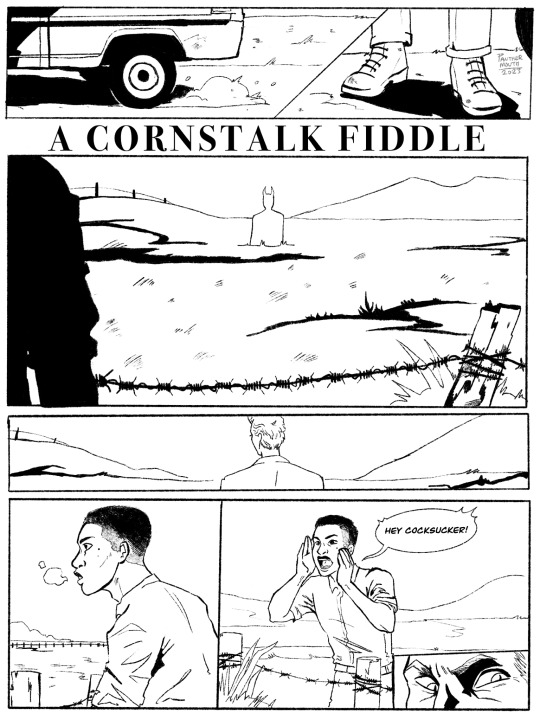
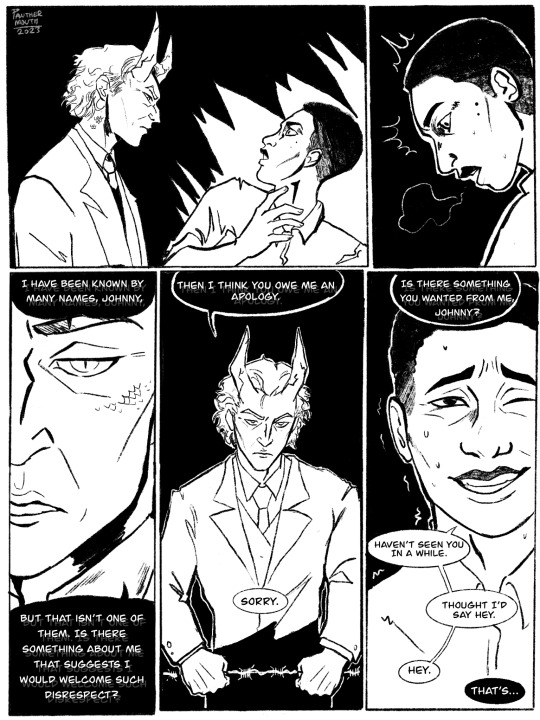
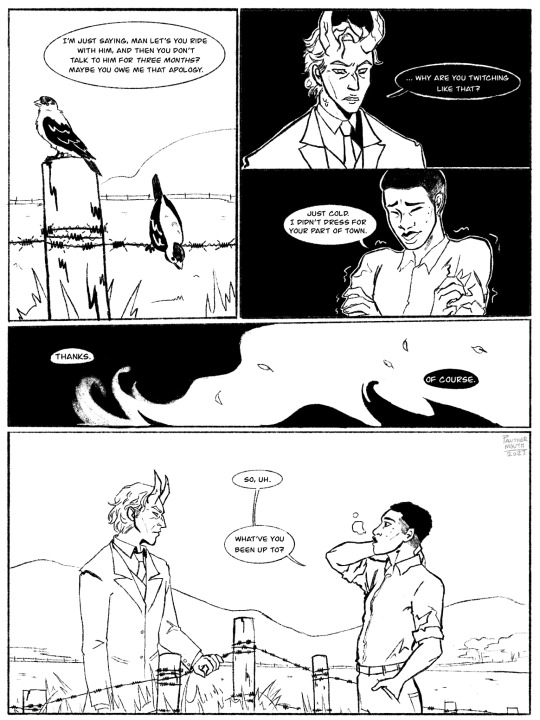
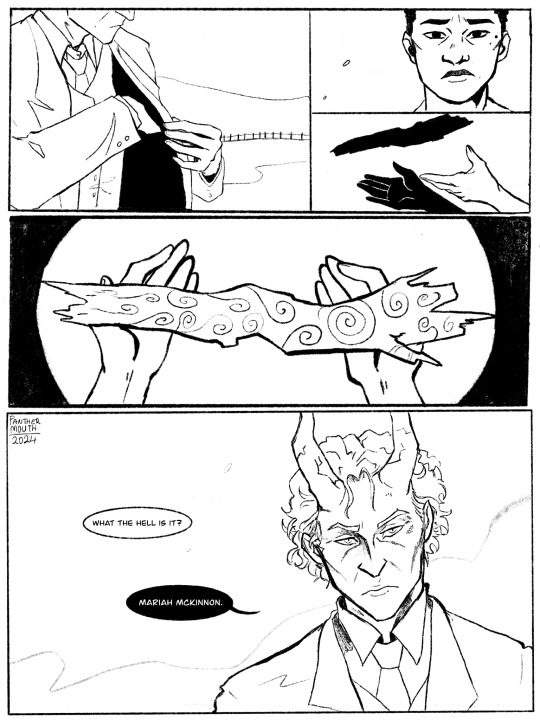
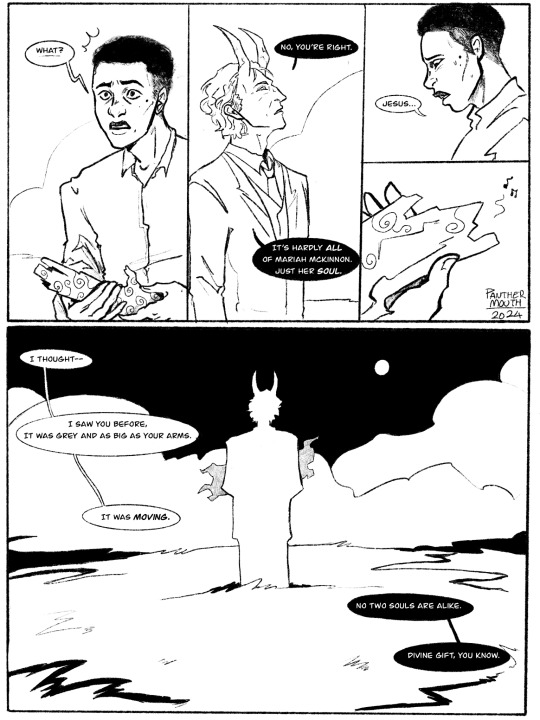
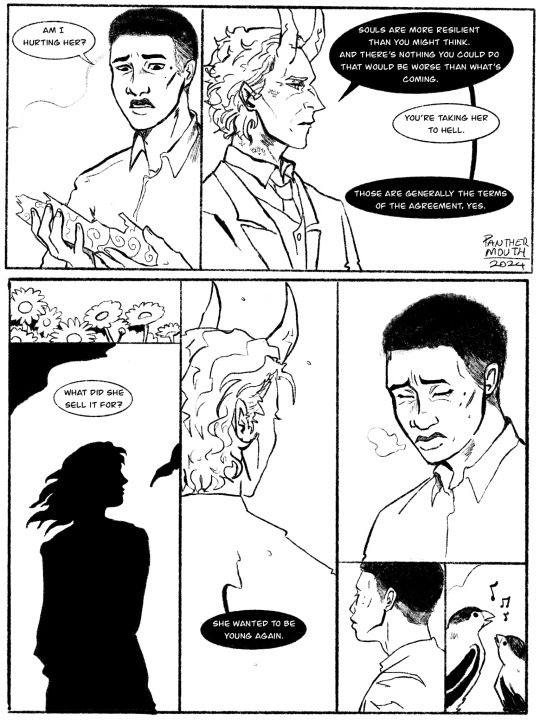
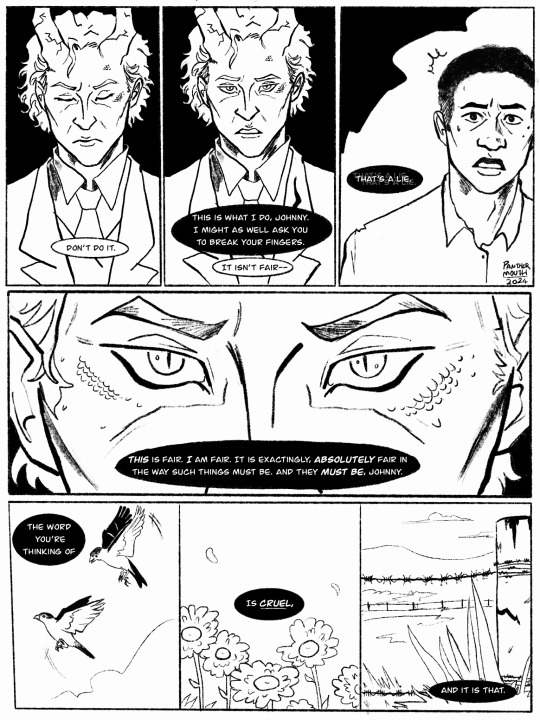
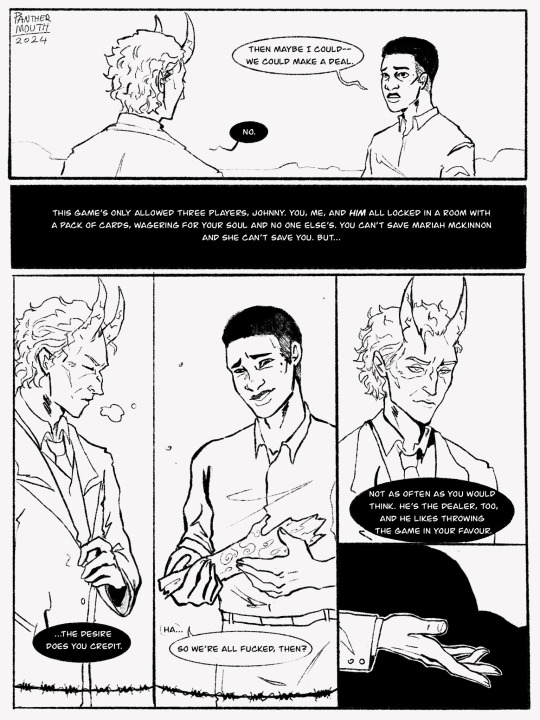
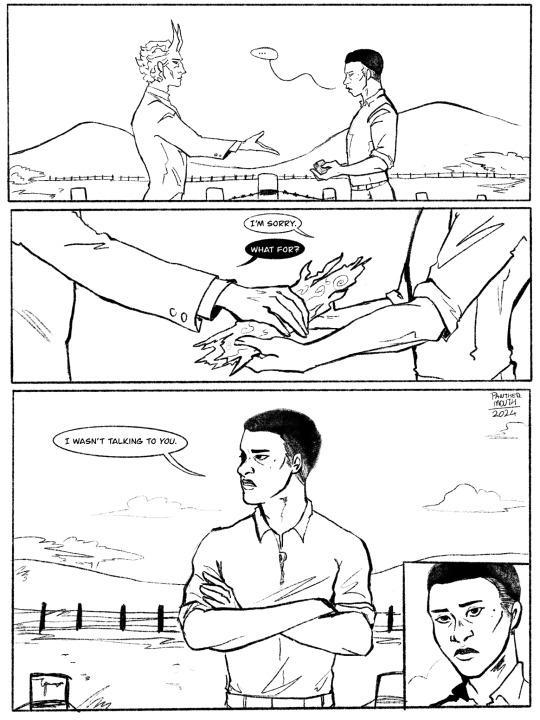

Where Johnny goes, the Devil follows; where Johnny goes, the Devil is already there.
Based on "A cornstalk fiddle" by the incredible @notbecauseofvictories
Finally finished this comic after months of zero progress. I adore this story and think about it often, and am so happy to finally be able to share this fan work with you. I hope you all enjoy!
#a cornstalk fiddle#my art#my comics#southern gothic#the devil went down to georgia#I finished it#I’m so glad to have done this#I’m so glad to have gotten some of The Images out of my head#my brains inner eye (?) is very strong and I can see and feel this entire story#I think that’s why it has stuck with me#the language is very visual in a way I don’t see often#sorry this took me so long to finish I hope it was worth the wait 😭
2K notes
·
View notes
Text

Wool & lana
The word lana (wool) in languages such as Spanish is etymologically related to English wool. For words to be related, they don't have to look like each other. Instead, you have to be able to trace them back to the same ancestor through regular sound changes - and that's what linguists managed to do with wool and lana. The infographic shows the Germanic and Romance family trees of these words.
#historical linguistics#linguistics#language#etymology#english#latin#french#dutch#german#spanish#proto-indo-european#proto-italic#proto-germanic#gothic#norwegian#swedish#old norse#danish#icelandic#catalan#portuguese#italian#romanian#low saxon#frisian#lingblr
741 notes
·
View notes
Text
It's frustrating to translate English poems with an iambic meter into Gothic.
English plural adjectives often have 1 or 2 syllables.
Gothic ones have at least 3 syllables in the genitive.
3 notes
·
View notes
Text
not to ramble about iwtv but i think a lot of people who balk at the unsavory parts of gothic fiction are people who have either 1) never truly had to face an onslaught of the macabre in their own life 2) have not actually sat with the discomfort of the darker parts of existence or simply not learned or had to learn how to process truly twisted emotions within themselves. and i bring this up in relation to iwtv because i see a lot of people pointing out 'problematic' parts of the book or bemoaning which ships are more or less toxic. and it's like it's a cow farm there's gonna be cows on the cow farm.
yeah anne rice wrote some weird shit and some of it is definitely unnecessary, most of those elements were corrected in the show. but a lot of it is just gothic fiction. you don't get to have sexy vampires, romanticism and tortured yearning without the inappropriate attachments, the true face of grief and the blurred lines between violence and eroticism which has evoked great interest in humans for centuries.
#iwtv#interview with the vampire#lestat de lioncourt#louis de pointe du lac#claudia de pointe du lac#claudia de lioncourt#i saw a lot of people on tiktok complaining about how claudia is described in the books#and when i started reading i expected something way worse#and it was like...nothing#it's uncomfortable at points but that is...the enTIRE PREMISE#she's not supposed to exist like that#they trapped an eternal soul in an unfinished body and it's wrong and inappropriate#but alSO i think some ppl just have lost understanding for descriptive language in gothic text#bc modern publishing often pushes for more basic sentence structures and less flowery prose#so when ppl read shit that does have the more classic style and is VERY descriptive w strong words they're like whAt#and it's like bro it's poetic u gotta be less literal
190 notes
·
View notes
